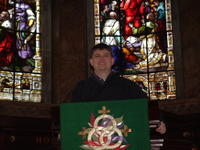The Beeson Pastors visited London and surrounding areas from September 30th to October 8th. While there we visited Holy Trinity Brompton (aka HTB, the birthplace of the Alpha Course) as well as two church plants of HTB's: Tollington Park, and St. Paul's Shadwell. We also visited three major John Wesley sites: Wesley Chapel and House, Epworth (Wesley's boyhood home), and Oxford (where Wesley was student and teacher). We also did siteseeing. I (Rob) saw: Big Ben (more appropriately known as the clock tower at Parliament), Parliament, Westminster Abbey, Buckingham Palace, the Tower of London, Tower Bridge, Samuel Johnson's Home (author of the first English Dictionary), HMS Belfast (WWII Ship), and much more.
Our HTB visit was powerful as we met with former HTB pastor Sandy Millar, attended worship at HTB, visited HTB church-plants, attended Alpha at HTB (where we saw Nicky Gumble speak), and attended Pastorates around London. Pastorates are gatherings of 3-4 small groups for a congregational type meeting. The Pastorate I attended met about 10 minutes walk from HTB in a Moravian church housed in 18th century stables once owned by Count von Zinzendorf (a friend and contemporary of Wesley). We also met as a group with Sandy and some other HTB people where we learned from Sandy, and where we were prayed for. It was a great experience to be ministered to by people of such love and humility.
When we visited the HTB plant at St.Paul's Shadwell -- we discovered that John Wesley preached his last sermon in this church. We saw the pulpit from which Wesley preached just weeks before his death. It was meaningful to walk in the places where Wesley walked, and kneel in the room known as the powerhouse where Wesley spent hours praying. This part of our pilgrimage connected me bodily to the movement Wesley began, and livened my spirit as I thought about Wesley's desire to renew the Anglican church. Bringing more meaning to this was to experience HTB which is a modern day version of the kinds of things Wesley was doing. Their pastorates are like Wesley's societies, their small groups like Wesley's class meetings. HTB is planting churches with homegrown leaders like Wesley did with his preachers. Most importantly for HTB and Wesley, of course, was the role of the Holy Spirit in powering the renewal. Thousands of people come weekly to discover this power of God at HTB, not unlike the thousands who came to faith and experienced the Holy Spirit during the ministry of Wesley and the people called Methodists.
What our pilgrimage has challenged me to do is remember the call of Jesus' on my life and the lives of all Christians to share the good news with others and to make Disciples of all nations. This must be done with a keen understanding of the cultures in which we find ourselves, and with a complete reliance on God (Father, Son, and Holy Spirit) who enables us to do anything of lasting eternal consequence. Wesley once said something like (I'm paraphrasing) "My fear is not that Methodists would someday cease to exist, but that they would exist as a dead sect." Methodists have a unique inheritance from John Wesley that the Spirit still brings to us today. It is the power to be transformed, and with God's help transform the world.






